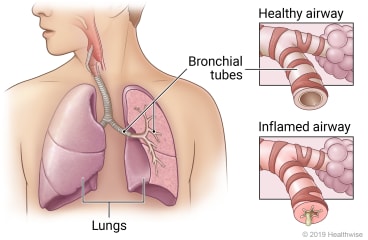Overview

Bronchitis is inflammation of the bronchial tubes, which carry air to the lungs. The tubes swell and produce mucus, or phlegm. The mucus and inflamed bronchial tubes make you cough. You may have trouble breathing.
Most cases of bronchitis are caused by viruses like those that cause colds. Antibiotics most often do not help and they may cause harm.
Bronchitis usually develops rapidly and lasts about 2 to 3 weeks in people who are otherwise healthy.
Follow-up care is a key part of your treatment and safety. Be sure to make and go to all appointments, and contact your doctor if you are having problems. It's also a good idea to know your test results and keep a list of the medicines you take.
How can you care for yourself?
- Take all medicines exactly as prescribed. Call your doctor if you think you are having a problem with your medicine.
- Get some extra rest.
- Take an over-the-counter pain medicine, such as acetaminophen (Tylenol), ibuprofen (Advil, Motrin), or naproxen (Aleve) to reduce fever and relieve body aches. Read and follow all instructions on the label.
- Do not take two or more pain medicines at the same time unless the doctor told you to. Many pain medicines have acetaminophen, which is Tylenol. Too much acetaminophen (Tylenol) can be harmful.
- Take an over-the-counter cough medicine to help quiet a dry, hacking cough so that you can sleep. Avoid cough medicines that have more than one active ingredient. Read and follow all instructions on the label.
- Do not smoke. Smoking can make bronchitis worse. If you need help quitting, talk to your doctor about stop-smoking programs and medicines. These can increase your chances of quitting for good.
When should you call for help?
Call 911 anytime you think you may need emergency care. For example, call if:
- You have severe trouble breathing.
Call your doctor now or seek immediate medical care if:
- You have new or worse trouble breathing.
- You cough up dark brown or bloody mucus (sputum).
- You have a new or higher fever.
- You have a new rash.
Watch closely for changes in your health, and be sure to contact your doctor if:
- You cough more deeply or more often, especially if you notice more mucus or a change in the color of your mucus.
- You are not getting better as expected.
Where can you learn more?
Go to http://www.healthwise.net/patientEd
Enter H333 in the search box to learn more about "Bronchitis: Care Instructions".
Current as of: September 29, 2025
Author: Ignite Healthwise, LLC Staff
Clinical Review Board
All Ignite Healthwise, LLC education is reviewed by a team that includes physicians, nurses, advanced practitioners, registered dieticians, and other healthcare professionals.

